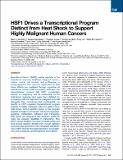HSF1 Drives a Transcriptional Program Distinct from Heat Shock to Support Highly Malignant Human Cancers
Author(s)
Mendillo, Marc L.; Santagata, Sandro; Bell, George W.; Hu, Rong; Tamimi, Rulla M.; Fraenkel, Ernest; Ince, Tan A.; Whitesell, Luke; Lindquist, Susan; Koeva, Martina I; ... Show more Show less
DownloadMendillo-2012-HSF1 Drives a Transc.pdf (2.008Mb)
PUBLISHER_POLICY
Publisher Policy
Article is made available in accordance with the publisher's policy and may be subject to US copyright law. Please refer to the publisher's site for terms of use.
Terms of use
Metadata
Show full item recordAbstract
Heat-Shock Factor 1 (HSF1), master regulator of the heat-shock response, facilitates malignant transformation, cancer cell survival, and proliferation in model systems. The common assumption is that these effects are mediated through regulation of heat-shock protein (HSP) expression. However, the transcriptional network that HSF1 coordinates directly in malignancy and its relationship to the heat-shock response have never been defined. By comparing cells with high and low malignant potential alongside their nontransformed counterparts, we identify an HSF1-regulated transcriptional program specific to highly malignant cells and distinct from heat shock. Cancer-specific genes in this program support oncogenic processes: cell-cycle regulation, signaling, metabolism, adhesion and translation. HSP genes are integral to this program, however, many are uniquely regulated in malignancy. This HSF1 cancer program is active in breast, colon and lung tumors isolated directly from human patients and is strongly associated with metastasis and death. Thus, HSF1 rewires the transcriptome in tumorigenesis, with prognostic and therapeutic implications.
Date issued
2012-08Department
Massachusetts Institute of Technology. Department of Biological Engineering; Massachusetts Institute of Technology. Department of Biology; Whitehead Institute for Biomedical ResearchJournal
Cell
Publisher
Elsevier
Citation
Mendillo, Marc L., Sandro Santagata, Martina Koeva, George W. Bell, Rong Hu, Rulla M. Tamimi, Ernest Fraenkel, Tan A. Ince, Luke Whitesell, and Susan Lindquist. “HSF1 Drives a Transcriptional Program Distinct from Heat Shock to Support Highly Malignant Human Cancers.” Cell 150, no. 3 (August 2012): 549–562. © 2012 Elsevier Inc.
Version: Final published version
ISSN
00928674
1097-4172